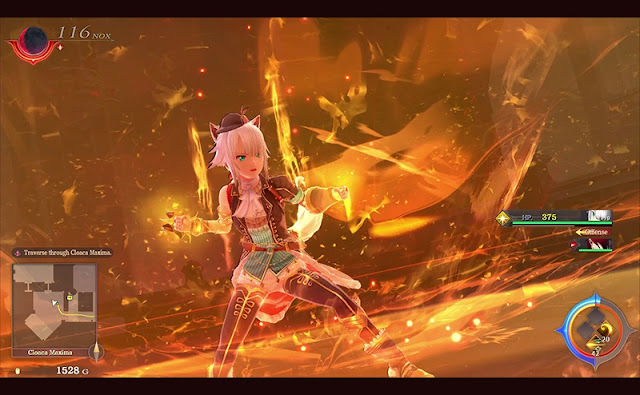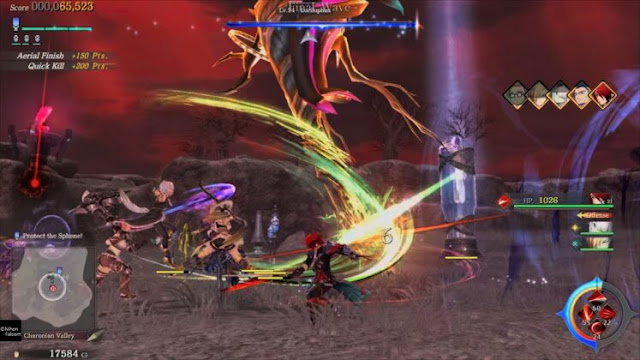“None are more hopelessly enslaved than those who falsely believe they are free,” so Johann Wolfgang von Goethe wrote once, and Ys IX reminded me of that quote a little. It’s not such a direct interpretation (we leave that to Persona 5), but imprisonment is the central, recurring theme and motif within Monstrum Nox, and for a series that has previously been so focused on exploration – a close associate to “freedom” – this game immediately makes it clear that it is going to have a very, very different tone to its predecessors. Thankfully, it works.
Just about every character in Monstrum Nox is imprisoned in some way. It can be literal imprisonment in that the city, which forms the hub of all the game’s activity, is a prison city, and indeed leading man, Adol, starts his adventure as an inmate looking for a way to break out. Even when he escapes he discovers that the entire city has been locked off from the rest of the world, effectively “trapping” him in it. Imprisonment can also be manifested as servitude, with all of the game’s heroes forming a regiment of “Monstrum” that are tasked – against their will – with protecting the city from otherworldy beings. Or the imprisonment can be more subtle and emotional – one character turns into a Robin Hood-like figure because she’s the daughter of a wealthy family that is exploiting the population to the detriment of their very health. Another story focuses on the spirit of a deceased father that drags his children into a dangerous otherworld because he can’t let them go. Don’t worry, these aren’t plot spoilers there since these things happen in the first couple of hour’s play, but to be spoiler-free the rest of the game continues to beat on this drum, and just about everywhere you look you’re going to see something that associates with some concept of imprisonment. Literally, or figuratively in the way that Goethe describes, Monstrum Nox is relentless, and the desperate actions of people to try and liberate themselves is an endlessly compelling hook within it.
On reflection, Monstrum Nox goes some really, really dark places. It’s something you can almost overlook as you play, because the aesthetic presentation is that of a colourful, bright, typically Nihon Falcom production. Even when Adol gets himself transformed into his “vampire” gothic costume (it happens when he uses his Monstrum powers, or ducks into the otherworld for some questing), it’s hard to see him as anything more than the bright red hair dude from the largely narrative-free Ys series.. It’s only when you put down the controller and reflect on what Monstrum Nox is really saying and doing that it becomes evident just how provocative the narrative can be. As I mention in my video on the game, I’m not usually the world’s biggest fan of the Ys series, because I play JRPGs for the narrative and Ys has traditionally been disinterested in that. Monstrum Nox is, narratively and thematically, the very inverse of that.
That’s not to suggest that with this new focus on storytelling the game plays badly, though. Quite the opposite. Ys has always been know for flowing, fluid dynamic combat, and Ys IX somehow manages to dial that up, too. Occasionally, it’s almost too much. I did lose sight of Adol in the whirling melee a few times, and one of the odd side effects of the extreme twitch pace of the combat is that the bosses can sometimes feel too simple – a game like Dark Souls gets away with having deeply challenging, complex, nuanced boss battles because within the game’s structure it gives you time to learn and respond. Ys’ boss battles, though visually intimidating, have a more limited range of attacks because, while they can be challenging, there’s almost SHMUP-like in terms of the response windows that they demand of the player. However, while it is almost too much at times it’s undeniable that Ys’ combat system works in its fury and fluidity, and that aggressive pacing benefits the theme and atmosphere of the game here better than any previous Ys title.
Some players might find that the speed of the combat system of Monstrum Nox does mean that the complexity of the systems are dialled right back in comparison to some genre stablemates. You earn special attacks through play that are mapped to button combinations, and then there’s a super attack, but combat doesn’t have the room for much more than that, since there just isn’t the time to puzzle through it. Those expecting the complexity of, say, a Tails game will be sorely disappointed by the limitations of Monstrum Nox, but on the other hand, as a fan of Dynasty Warriors, I’ve long grown accustomed to combat systems that are more about fluidity and flow than they are about fighting game-style combo and pattern memorisation, and I had a blast carving through common enemies and bosses alike throughout the entire adventure.
Further showing just how deep the developer’s understanding of the game is, while the combat system would almost become repetitive if that’s all you did in dungeons, the labyrinths of Ys IX are filled with secrets, and many of them are hard to get to. You’ll see a treasure chest far in the distance, and struggle to work out how to get there. You’ll want it, because it’s almost certainly going to hold some worthwhile loot, and so you’ll give the button-mashing progress a break for a fair chunk of time while you work it out. Enemies don’t respawn while in a dungeon, so you can actually take the time to sort of the puzzles without the frustration of enemies popping back into your way suddenly, too. Monstrum Nox also has a habit of rewarding the most exploration-minded players with the discovery of little grottos filled with treasure and a little cut scene to celebrate how clever the player was to get there, and more generally there are all kinds of little secrets that you’ll just happen to come along while wandering around. Rather than allow players to become exhausted with any one element of it, Ys IX deftly balances out combat, exploration, and puzzle-solving such that, in combination with some masterful level design, it offers the kind of nuanced and interesting dungeons that you just don’t expect going into a Ys game. I know IX’s predecessor, VIII, was in particular celebrated for elevating the gameplay and combat beyond what fans had previously experienced, but IX takes it to an entirely different level again.
Monstrum Nox struggles to be as visually dark as the narrative and adventure sometimes demand, but it’s by no means a bad aesthetic (and if it were too dark it wouldn’t be anywhere near the joy that it is to play). Nihon Falcom has developed a distinct JRPG aesthetic that is uniquely theirs, and while you could perhaps argue that Trails of Cold Steel, Tokyo Xanadu and Ys are too different to share similar character models and design qualities, the fact is that this bold, clean 3D model design really works as a blank canvas, regardless of what the company is doing. I am actually a little concerned about what will happen with Nihon Falcom with the next generation, as I would hate to see the company start to try to “upgrade” the visuals that they have carefully honed over the last two generations. What the art team has to work with now works, and it’s a quality that I would like to see the developer stick with into the foreseeable future.
Speaking of PlayStation 5, though, the one complaint that I have with Monstrum Nox is that it crashes a lot. About once per hour on average. I played the game exclusively on PlayStation 5 and didn’t have the time to check if it was any more stable on the PS4, but either way, I do assume that patches will address the issue. It’s also not a huge deal in terms of gameplay progress when it does crash. because the auto-save is generous, but it does beak with the immersion and atmosphere quite unfortunately given how important those qualities are to the overall experience.
– Matt S.











